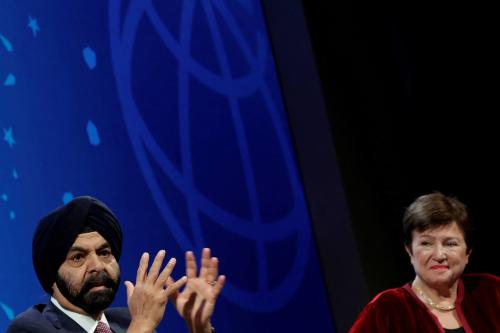From, November 30 to December 1, world leaders will meet in Buenos Aires to wrap up the G-20’s work in 2018. One of the Summit’s priorities includes how to unleash people’s potential in the context of a rapidly changing future of work. Investing in human capital is among its core proposals: “Making the new wave of technological breakthroughs as inclusive as possible will require considerable investment in training and skills for life and work.” Education is at the crux.
Last month, the central role of human capital as a determinant of economic and social progress received three significant boosts. First, Paul Romer shared the Nobel Prize in Economics for his contributions to the theories of economic growth. In his endogenous growth model, investing in human capital and knowledge creation are key drivers of the technological innovations that determine growth. Second, the World Bank released a Human Capital Index, an advocacy and evaluation tool for assessing how far countries are from achieving their productive potential relative to a benchmark of complete education and full health, as well as encourage governments and partners to take actions to close the massive human capital gap that exists. Third, the salient importance of human capital was prominently acknowledged in Proposal 1 of Making the global financial system work for all, the new report by the G-20 Eminent Persons Group on Global Financial Governance. More precisely, the report calls for refocusing on human capital as a foundation for a stronger investment climate, building more inclusive societies, and reaching the Sustainable Development Goals (SDGs).
Investing in broad-based human capital distinctly creates a three-way win-win. Human capital is key for economic growth. Human capital investments are also key for building equitable societies. And human capital is not only “capital”—that is, an input for production—but higher levels of human capital immediately translate into superior quality of life. Better health and nutrition, achieving literacy and numeracy, and access to modern sanitation services not only make people more productive but vastly improve their living conditions and well-being. Human capital improvements translate into longer, healthier, and more fruitful lives.
Is the global financial system ready to support human capital investments of the type and in the scale that the world needs? For now, it is not. The required type and scale of human capital investments will only happen if financial resources, data, knowledge, coordination, leveraging, surveillance capacity, and governance in the IFIs are revamped and realigned. The EPG report recommends actions and reforms conducive for the needed revamping and realignment of the IMF and the multilateral development banks (see a summary on Future Development here).
The international financial institutions (IFIs) are indeed in a unique position to help governments achieve the human capital/human development goals embedded in the SDGs. IFIs could provide adequate support with:
- Better inter-institutional coordination: Proposals 2 and 3 focus on building country and regional collaboration platforms to facilitate joint and mutually re-enforcing efforts, while Proposal 7 proposes integrating trust fund activities into core operations to avoid fragmentation.
- Better data and cutting-edge knowledge: Proposal 8 focuses on the importance of IFI’s continuing to invest in data and policy-relevant research.
- Innovation and capillarity at the grassroots level: Proposal 9 focuses on the importance of leveraging more on the ideas and operating networks of business alliances, NGOs, and philanthropies.
The IFIs are also uniquely positioned in helping governments estimate how much reaching the human development goals would cost and find the mechanisms to finance these investments. In particular, the IFIs can help governments ensure tax collection is efficient and progressive and target resources where they are most needed, reduce waste and corruption in public spending, and adopt best practices in the deployment of education, health, and sanitation services.
The IFIs can also provide realistic assessments of how much of the financing of investments in human capital can actually rely on improvements in domestic resource mobilization. The IMF estimates that, on average, low-income developing countries will need additional annual outlays of 14 percentage points of GDP on average in the areas of education, health, water and sanitation, roads, and electricity to achieve the SDGs. Across 49 low-income developing countries, about $520 billion a year in additional spending is needed.
However, where will the additional needed resources come from? Boosting domestic tax revenue is an obvious option, especially for emerging economies but it will not be sufficient to meet the financing needs of most low-income developing countries. In fact, too much emphasis on domestic resource mobilization—especially in the poorer countries—could badly backfire: if, for instance, consumption taxes are raised, the poor may be left worse off. Moreover, borrowing may not be an option for many of these low-income countries because they are at risk of or are already experiencing debt distress. Foreign assistance will have to continue playing its part, but this too will not suffice. Recognizing these limitations, the EPG report makes a central recommendation: Proposal 4 to shift the basic business model of Multilateral Development Banks from direct lending towards risk mitigation (including political risk insurance schemes) to mobilize significantly greater private equity investment.
As important as finding ways to invest more and more efficiently in human capital is, it is also crucial to prevent human capital from falling. We often forget that one of the greatest costs of financial crises, natural disasters, and pandemics is the destruction of human capital, which often can never be rebuilt. Malnutrition at an early stage in life cannot be reversed by consuming more food at an older age. Adult literacy programs cannot replace not attending school or not completing primary school.
Hence Proposal 6, which focuses on the importance of strengthening the joint capacity of the IFIs to tackle challenges of the global commons. Challenges include preventing and coping with environmental threats related to climate change, degradation of ecosystems, water scarcity, systemic health risks from pandemics, and the rapid spread of antimicrobial resistance. Crucially, the EPG report devotes an entire section (Section II) to recommendations that should prevent financial crises from happening in the first place and help countries manage crises at the minimum cost to their economies and people. In particular, it calls for: strengthening the risk surveillance and policy follow-up capacity of IMF and other central actors (Proposals 12 and 13), ensuring an adequately-resourced and reliable global financial safety net at the earliest (Proposal 14), establishing a standing IMF liquidity facility to give countries timely access to temporary support (Proposal 15), and enabling the IMF to quickly mobilize additional resources in the face of severe global crises (Proposal 16).




Commentary
Making the global financial system work for all: A message for the G-20
November 29, 2018